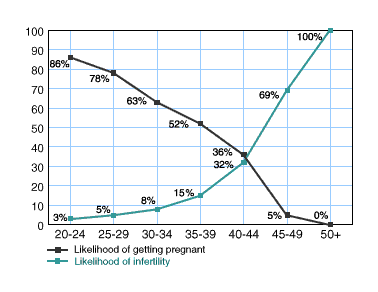Fertility rates decrease with age
Most women are aware their fertility declines with age. This “ticking of the biological clock,” or ovarian aging, begins in a woman’s late 20’s and continues into her mid 30’s, at which time the drop begins to occur more rapidly. By age 40, the percentage of women who become pregnant has dropped to single digits. And when women reach menopause (age 50, on average), their ovaries are no longer producing eggs.
Why does this happen?
As a woman ages, her eggs decrease in both their quantity, and quality.  And while some believe that women who are more physically fit stand a better chance of increasing their “fertility years,” the eggs a woman ovulates in her adult life have actually been in her ovaries since before birth, and have been slowly but surely losing their reproductive capabilities since that time. This is referred to as diminished ovarian reserve, or DOR.
And while some believe that women who are more physically fit stand a better chance of increasing their “fertility years,” the eggs a woman ovulates in her adult life have actually been in her ovaries since before birth, and have been slowly but surely losing their reproductive capabilities since that time. This is referred to as diminished ovarian reserve, or DOR.
What can I do?
More than any factor, age is the biggest contributor to a woman’s decrease in fertility. So, that’s why we say waiting is unwise. Discover what time your own biological clocks is reading, by consulting with one of our board-certified reproductive endocrinologists. Just give us a call, or if you like, send us a confidential email. Because the clock never stops ticking.
Source: Management of the Infertile Woman by Helen A. Carcio and The Fertility Sourcebook by M. Sara Rosenthal